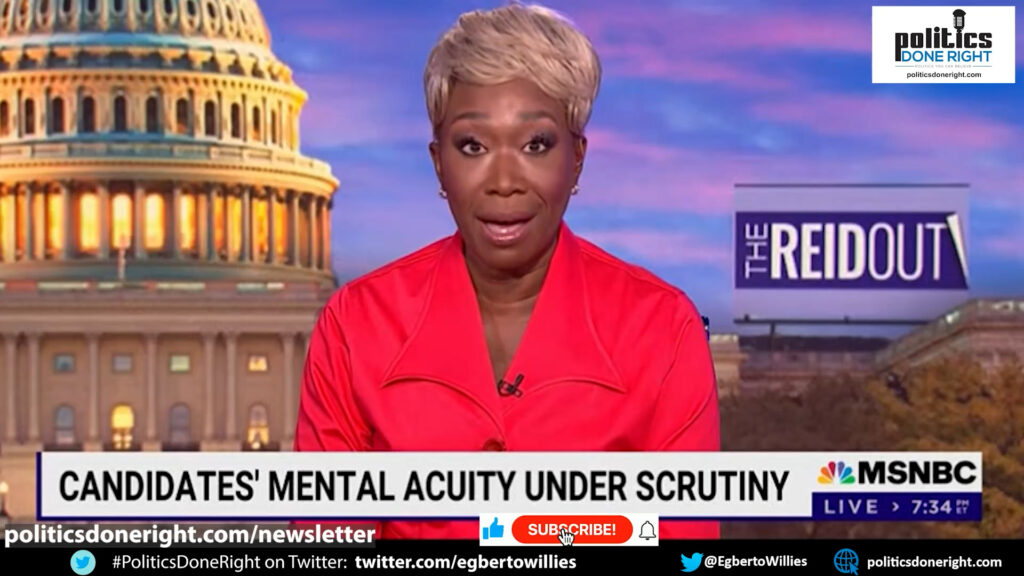The mainstream media has supported GOP whataboutism and false equivalences. Joy-Ann Reid calls it out with examples recently.
MSNBC’s Joy-Ann Reid goes ballistic on MSM.
The critical role of media in shaping public perception cannot be overstated. Journalism, at its best, serves as the Fourth Estate, a check on power and a guardian of democracy. However, MSNBC’s Joy-Ann Reid‘s recent critique of mainstream media’s coverage of President Biden and Donald Trump highlights a glaring issue: the disparity in media scrutiny. Her observations point toward a collective failure to maintain even-handed coverage, especially in the comparison of both presidents on matters such as age, mental acuity, and track records.
In this clip:
- Joy-Ann Reid of MSNBC criticizes mainstream media for their uneven coverage of President Biden and former President Trump, specifically pointing out the media’s focus on Biden’s age while neglecting to discuss Trump’s similar age and questionable mental acuity.
- Reid highlights inconsistencies, such as an Axios article that discusses Biden’s age and physical activities like wearing sneakers and exercising but doesn’t do the same scrutiny for Trump, who is only three years younger than Biden.
- The segment criticizes the media’s lack of focus on Trump’s numerous verbal gaffes and inconsistencies, which range from geographical errors to a misunderstanding of American history. Reid argues that these issues could be indicators of Trump’s mental acuity, a topic the media largely avoids.
- Reid contrasts the legal and moral records of Biden and Trump, arguing that the media should focus on who has actually “delivered for the American public” and “who’s willing to preserve our democracy.” She notes that Trump has led an insurrection, been indicted on felony counts, and made multiple inflammatory statements.
- Reid calls for more responsible journalism that provides balanced scrutiny of both political figures rather than feeding into superficial narratives. She emphasizes the need for the media to focus on issues of substance, such as the candidates’ capacity to govern and their impact on American democracy.
Reid’s criticism begins with the media’s fixation on President Biden’s age, exemplified by headlines that focus on his sneakers and exercise habits as signals of his old age. This seemingly innocuous detail becomes far more insidious when compared to the lack of similar coverage concerning Trump, who is merely three years younger than Biden. The media’s selective scrutiny does a disservice to its audience, who deserve a fuller understanding of both presidents to make informed political judgments. As media critic Jay Rosen has argued, journalism that excessively focuses on surface traits like age without substantive context can perpetuate ignorance rather than combating it.
Even more concerning is Reid’s assertion that the media’s “both-sides-ism” could lead the United States toward autocracy. For an industry that frequently presents two sides of a coin for objectivity’s sake, the media strikingly fails to apply this approach when covering Biden and Trump’s ages or mental acuities. This lack of balanced coverage is an ethical lapse and a civic one. Numerous studies, such as the one conducted by the Pew Research Center, reveal that uneven media representation can substantially influence public opinion and erode trust in democratic institutions.
Reid also takes the media to task for its apparent myopia regarding the track records of Biden and Trump. While media outlets quickly hone in on Biden’s age or his choice of footwear, they often neglect the more pressing matters of governance and policy. Reid states that only Trump has led an insurrection, been indicted on multiple felony counts, and found civilly liable for various crimes, including sexual assault. This glaring discrepancy in media focus goes beyond journalistic bias; it is a crisis of priorities.
Moreover, Reid questions the very premise of focusing on age as a determinant of presidential competence. The more important question, as she rightly puts it, is who has delivered for the American public and who’s willing to preserve democracy. This calls for a reevaluation of the metrics that both media and the public should employ when assessing leaders. As articulated by the American Press Institute, the goal of journalism should be to provide citizens with the information they need to make the best possible decisions about their lives, communities, societies, and governments.
Joy-Ann Reid’s critique serves as a call to action for mainstream media to reevaluate its priorities and methodologies. Media outlets must rise to the occasion and fulfill their societal role as unbiased informers, educators, and watchdogs. In an era of deepening political divides and rampant misinformation, the need for balanced, in-depth, and responsible journalism has never been greater. Failing to meet this standard not only undermines the media’s credibility but also jeopardizes the very democracy it claims to protect.
Viewers are encouraged to subscribe and join the conversation for more insightful commentary and to support progressive messages. Together, we can populate the internet with progressive messages that represent the true aspirations of most Americans.

